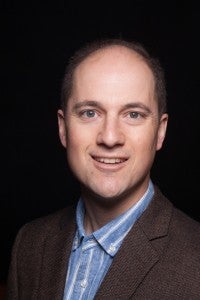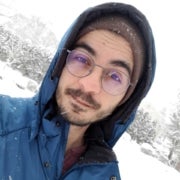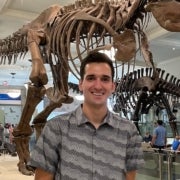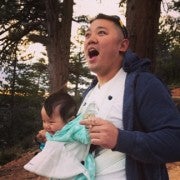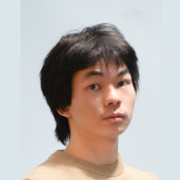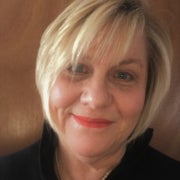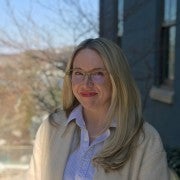Adam Siepel, Ph.D.
Adam Siepel, Ph.D., is a Professor in the CSHL School of Biological Sciences and serves as Chair of the Simons Center for Quantitative Biology (SCQB). Prior to this, Dr. Siepel worked as an associate professor in the department of Biological Statistics and Computational Biology at Cornell University. Dr. Siepel earned his Ph.D. in Computer Science from UC Santa Cruz in 2005. He also holds a B.S degree in Agricultural and Biological Engineering from Cornell University (1994) and a M.S. degree in Computer Science from the University of New Mexico (2001). He joined Cold Spring Harbor Laboratory (CSHL) in 2014.
Dr. Siepel has authored nearly 100 peer-reviewed publications. He has served on the editorial boards for Genome Research and PLOS Computational Biology, on review panels for the National Science Foundation and the National Institutes of Health, and on advisory committees for the National Science Foundation CAREER Award, and a Sloan Research Fellowship. Dr. Siepel is also an affiliate member of the New York Genome Center (NYGC) where he co-chairs a new NYGC Working Group on Population Genomics.
Current Lab Members
Lab Administration
Lab Alumni
Armin Scheben (Postdoc, 2019-2024). Armin developed and applied comparative genomics approaches to study complex genomes, focusing on convergent adaptation and genome-wide fitness effects estimation in the Andropogoneae grass tribe. Armin is a Senior Staff Scientist in Computational Biology at the New York Stem Cell Foundation.
Lingjie Liu (Ph.D. student, 2020-2024). Ling was a Ph.D. student in Genetics at Stony Brook University who applied novel computational methods to understand gene regulation from an evolutionary perspective. Ling is a Scientist I in Computational Biology at BioMarin Pharmaceuticals.
Yixin Zhao (Research Investigator, 2018-2024). Yixin who joined the lab as a postdoc and later became a research investigator, applied novel computational and experimental techniques to study the evolution of gene regulation, focusing on transcriptional and post-transcriptional aspects.
Ziyi Mo (CSHL grad student, 2019-2024). Mo applied machine learning methods to detect natural selection in the genome, focusing on features extracted from the ancestral recombination graphs. Mo is a Research Scientist in Machine Learning at Meta.
Ritika Ramani (Computational Science Developer II, 2015-2022)
Mehreen Mughal (Post doc, 2020-2022)
Irene Gill (Senior Scientific Administrator and Assistant to the Chair, 2014-2021). Irene provided administrative support to Dr. Siepel and several other faculty members within the SCQB.
Elizabeth Hutton (CSHL grad student 2015-2020). While in the lab, Lizzie developed quantitative models to leverage CRISPR screens to study gene essentiality, focusing on non-oncogene addiction in cancer subtypes. Lizzie is now a Computational Biologist at ArtisanBio in Louisville, CO.
Noah Dukler (Ph.D. student 2014-2018; Post-Doc 2019-2020). While in the lab, Noah worked on the mechanisms and evolution of gene regulation. He is now a bioinformatician at Illumina.
Hussein Hijazi (Postdoc, 2018-2020). Estimation of selection using the Ancestral Recombination Graph (ARG) and machine learning. Hussein is now a Principal Computational Researcher at Genentech, a member of the Roche Group, where he develops strategies and analytical methods leveraging genetic and phenotypic data across hundreds of thousands of samples from internal data repositories and biobank initiatives for drug discovery.
Melissa Hubisz (Ph.D. Student, 2014-2019). New methods for ancestral recombination graph inference and demographic reconstruction for human populations. Before resuming her graduate work, Melissa was the lead programmer and lab manager for the Siepel lab from 2008-2014. Melissa is currently working at the Bioinformatics facility in Cornell’s Institute of Biotechnology.
Amit Blumberg (Postdoc, 2016-2019). Understanding the role of non-coding RNA stability using a computational approach that leverages high throughput molecular genetics experiments. Amit is currently a Senior Computational Scientist at 1E Therapeutics.
Adrian Platts (Research Associate, 2016-2019). Understanding fitness consequences of mutations in plant species.
Yi-Fei Huang (Postdoc, 2015–2018). Novel statistical models to study the mechanisms of evolution and gene expression. Yi-fei is currently an Assistant Professor in the Department of Biology and the Huck Institute of the Life Sciences at Pennsylvania State University.
Leonardo Arbiza (Postdoc, 2010–2013). Natural selection on transcription factor binding sites in recent human evolution. Leo was a joint postdoc between the Siepel and Keinan Labs at Cornell, with a focus on X-vs.-autosome genetic variation. Leonardo is currently a Computational Biology Research Scientist at Twist Bioscience, a startup company that has revolutionized massive high quality DNA synthesis.
Bronislava Brejova (Postdoc, 2006–2008). Comparative genomic methods for gene prediction. Brona is now an associate professor in the Department of Computer Science at Comenius University in Bratislava, Slovakia.
Sang Chul Choi (Postdoc, 2010–2013). Comparative genomics and transcriptomics of Streptococcus species. Sang Chul collaborated with Mike Stanhope at Cornell and Robert Burne at the University of Florida on various comparative and functional genomic analyses of pathogenic Streptococci. Sang Chul is currently in the Department of Biotechnology at Sungshin Women’s University, Seoul, Republic of Korea.
Omar Cornejo (Postdoc, 2009–2010). Population genetics of Streptococcus species. Omar contributed to a joint project involving the Siepel, Bustamante, and Stanhope labs before finishing his postdoc with Carlos Bustamante at Stanford. Omar is now an assistant professor of biology at Washington State University.
Charles Danko (Postdoc, 2009–2014). Computational and experimental research in transcriptional regulation, including estimation of transcription rates, prediction of enhancers, and comparative genomics of gene regulation in primates. Charles is now an assistant professor at the Baker Institute for Animal Health and the Department of Biomedical Sciences at Cornell. He continues to work with the Siepel and Lis Labs on analyses of GRO-seq and PRO-seq data.
Ilan Gronau (Postdoc, 2009–2014). Development of coalescent-based methods for demography inference (G-PhoCS) and probabilistic methods for measuring the influence of natural selection on dispersed genomic elements (INSIGHT). Ilan is now a senior lecturer at the School of Computer Science in the Interdisciplinary Center (IDC), Herzliya, Israel. He continues to collaborate with the Siepel Lab from Israel.
Brad Gulko (Ph.D. Student, 2010–2017). Developed a novel Bayesian scoring system for identifying combinations of functional genomic assay results that pinpoint genomic positions with identifiable fitness consequence (“fitCons” scores). Brad is now a staff engineer at Caspar.ai.
Carolin Kosiol (Postdoc, 2006–2008). Comparative genomics of mammals, including positive selection in primates. Carolin is currently a Lecturer in Bioinformatics at the School of Biology, University of St. Andrews, Fife, UK.
Andre L. Martins (Ph.D. student, 2007–2014). Bioinformatic analysis of transcriptional regulation in mammals and Drosophila, in close collaboration with the Lis Lab. Andre has returned to his native Portugal and is working in software development.
Jaaved Mohammed (Ph.D. student, 2009–2016). Molecular evolution of miRNAs in Drosophila. Jaaved was a joint member of the Siepel Lab and Eric Lai’s Laboratory at Memorial Sloan Kettering Cancer Center. He is now a postdoc with Joanna Wysocka at Stanford.
Lenore Pipes (Ph.D. student, 2012-2017). Evolution of alternative splicing in primates. Lenore was a joint member of the Siepel Lab and Christopher Mason’s Laboratory at Cornell University. She is now a postdoc with Rasmus Nielsen at UC Berkeley.
Matthew Rasmussen (Postdoc, 2011–2013). Genome-wide inference of ancestral recombination graphs. Matt is now a software engineer at Counsyl, Inc. in South San Francisco. Occasionally, we still lure him into thinking about ancestral recombination graphs for old times’ sake.
Tomas Vinar (Postdoc, 2006–2008). Probabilistic models of gene cluster evolution. Tomas is now an associate professor in the Department of Applied Informatics at Comenius University in Bratislava, Slovakia.
Other Alumni
Master’s students
Adam Diehl, Michael D. Phillips
Undergraduate researchers
Alexandra Denby, Tytus Mak, Alison Marklein, Joseph Porter, Renee Setter, and Daniel Sussman.

